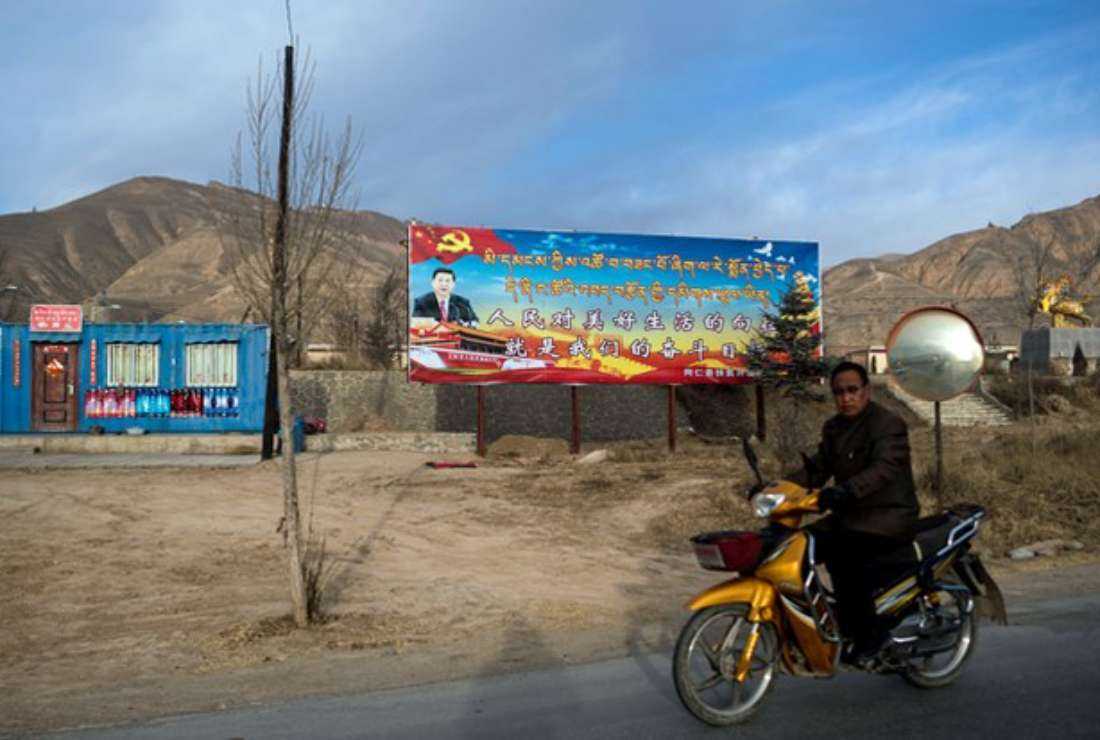
The confiscation of farmlands will render people without any means of livelihood, villagers say

A motorcyclist rides past a propaganda poster showing China's President Xi Jinping, outside Rebgong in China's Qinghai province, March 2, 2018. (Photo: AFP)
Tibetan villagers living in western China have criticized the authorities for an eviction notice asking them to vacate their land for the construction of a hydro-power dam allegedly without compensation, says a report.
The residents of Lingya village in Rebgong country have received a government order dated May 23 requiring people in seven villages to vacate their land within 10 days to facilitate the dam’s construction, Radio Free Asia (RFA) reported on May 30.
Rebgong lies in Huangnan of Tibetan Autonomous Prefecture, a Tibetan-populated area of China’s Qinghai province.
The order threatens the villagers as their farmlands – the only source of their livelihood, will be gone if sized for the dam, two villagers said.
An unnamed villager who has left the area has stated that the move deprives the villagers of their land rights.
“The land that is being confiscated by the Chinese government is farmland, which is the livelihood of Tibetans,” the unnamed villager said.
The villager also alleged that “the authorities have warned the Tibetans to not show any kind of condemnation.”
According to a second unnamed resident in exile, the notice warned the residents that they would not be compensated if they do not vacate and proceed according to the guidelines.
“In a notice sent out by the Chinese authorities regarding the land grab, it mentions that those in areas that need to be vacated for dam construction must be prepared to [leave],” said the unnamed villager.
“They must not start any other construction in that area. If people don’t abide by it, then they will not be compensated,” the villager further added.
There have been frequent standoffs between residents and Chinese infrastructure and development firms over alleged land grabbing and disruption to the day-to-day lives of the people.
Residents said that protests have been suppressed and organizers have been detained to ensure that the residents comply with the government requirement.
Rights groups have long accused China’s communist regime of undermining political rights and human rights as well as the cultural and religious identity of Tibetans within the region and those living in other provinces.
For centuries, Tibet has been known for its unique cultural and religious community that thrived with the strong influence of the Tibetan language and Tibetan Buddhism.
The region borders with the Chinese provinces of Sichuan, Qinghai, and Yunnan along with the countries of Myanmar, India, Bhutan, and Nepal.
Tibet was mostly isolated from the world until the 1950s when Chinese forces annexed it by claiming it had always been an integral part of China.
Tibetans in the region and outside consider China’s action as an invasion by a foreign force and have long struggled for independence despite brutal suppression.
Help us keep UCA News independent
The Church in Asia needs objective and independent journalism to speak the truth about the Church and the state.
With a network of professionally qualified journalists and editors across Asia, UCA News is just about meeting that need. But professionalism does not come cheap. We depend on you, our readers, to help maintain our independence and seek that truth.
A small donation of US$2 a month would make a big difference in our quest to achieve our goal.

Share your comments